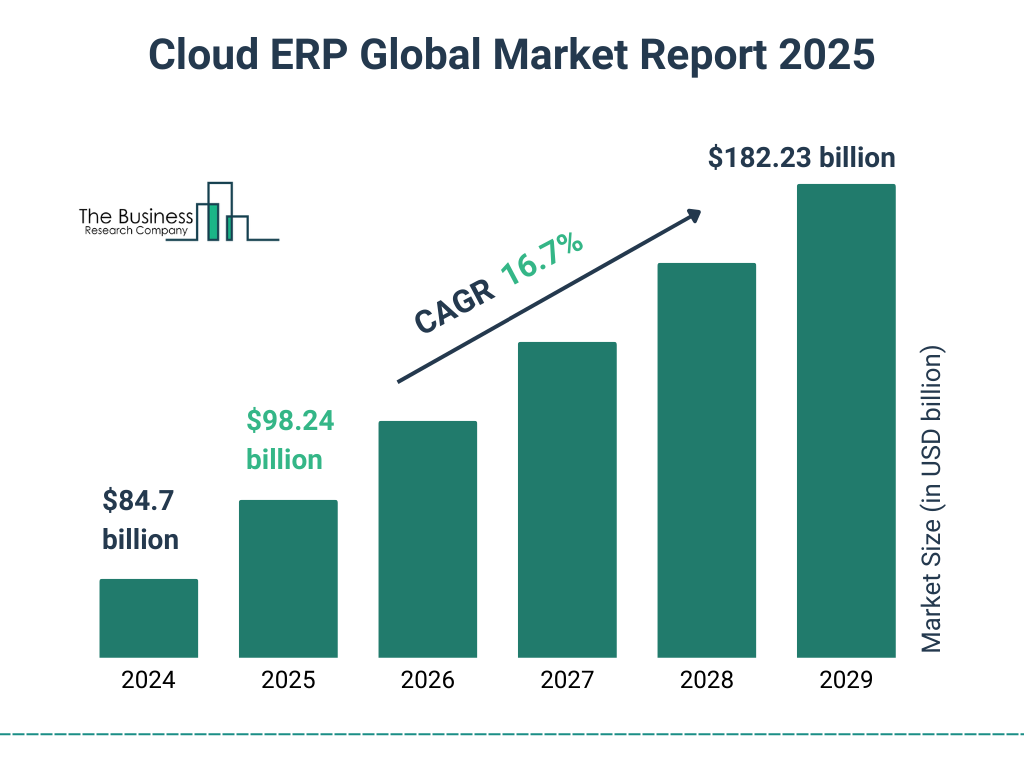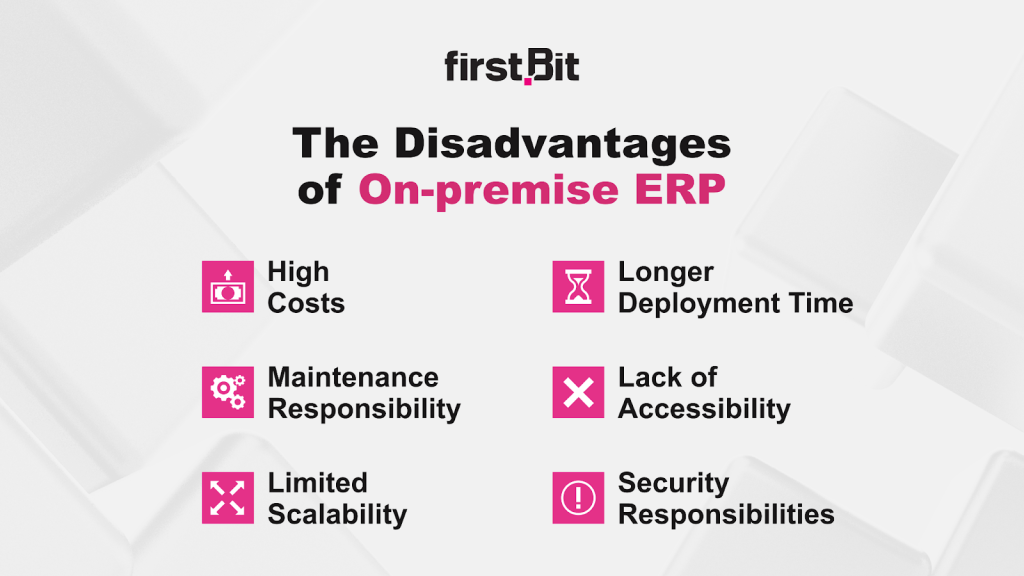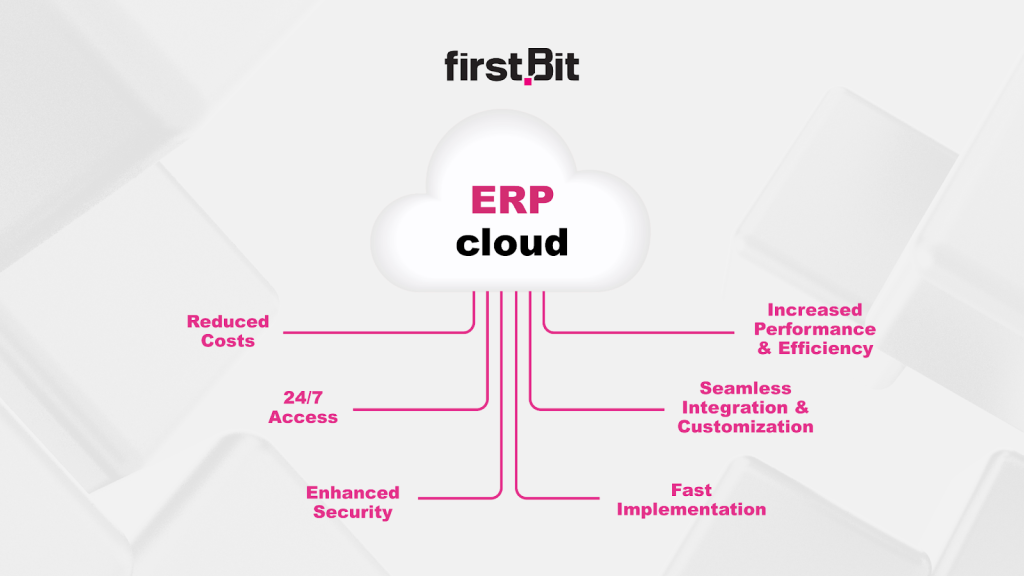Businesses across industries are under increasing pressure to improve how they operate, scale efficiently, and adapt to changing demands. In response, many are turning to digital tools that offer flexibility and real-time insight. One of the most impactful technologies driving this transformation is cloud ERP (Enterprise Resource Planning).
Unlike traditional ERP systems that require large capital investments and ongoing IT management, cloud ERP provides a modern alternative. It enables companies to manage their operations through a secure, web-based platform without needing to maintain physical infrastructure.
Cloud ERP systems are gaining traction for a reason. They allow organizations to optimize workflows, reduce overhead, and improve visibility across departments. As businesses face mounting economic and operational pressures, these benefits have become essential, not optional.
The global cloud ERP market is expected to grow from $84.7 billion in 2024 to $98.24 billion in 2025, reflecting a 16.0% compound annual growth rate. [?]
This sharp growth reflects how companies are shifting their strategies, replacing outdated systems with cloud-based solutions that support more agile, cost-effective operations.
What Is Cloud ERP?
Cloud ERP (Enterprise Resource Planning) is a modern software system delivered over the internet, allowing businesses to manage essential operations through a centralized digital platform. Core functions typically include finance, supply chain, procurement, human resources, and customer relationship management (CRM).
What sets cloud ERP apart is how it’s hosted. Unlike on-premise ERP systems that run on servers maintained by the company, cloud ERP is managed by a third-party service provider. The system and its data are stored on secure remote servers, and users access the software via a web browser.
This model offers several key benefits: automatic updates, secure data backups, reduced IT workload, and the flexibility to access the system from anywhere. It’s especially useful for companies operating across multiple locations or managing remote teams.
Cloud ERP serves as a single source of truth for the organization. It centralizes data and enables real-time collaboration between departments. Instead of relying on disconnected tools or manual data entry, teams can make faster, more accurate decisions based on shared, up-to-date information.
These platforms are designed to support a wide range of business functions, including:
-
Financial planning and reporting
-
Procurement and inventory tracking
-
HR and payroll management
-
Customer relationship workflows
-
Manufacturing and logistics coordination
By offering a unified view of business operations, cloud ERP improves internal alignment, reduces delays, and helps companies respond faster to both challenges and opportunities.
Why Move from On-Premises to Cloud ERP?
Many businesses still operate on legacy ERP systems hosted on their own servers. While these systems may have worked in the past, they come with limitations that can restrict growth and innovation.
On-premise ERP typically requires large capital investments in hardware, software licenses, and in-house IT staff. The systems are more complex to update, harder to scale, and less accessible when employees are working outside the office.
Challenges with on-premise ERP Systems:
-
Higher initial and maintenance costs
-
Internal responsibility for upgrades, security, and troubleshooting
-
Limited flexibility when scaling to new locations or users
-
Restricted access outside of company networks
-
Greater risk of downtime and data loss without proper safeguards
These challenges have led many organizations to transition to a cloud-based ERP model. Cloud ERP platforms reduce infrastructure costs, streamline deployment, and provide greater flexibility to adapt to business needs over time. With less dependence on internal IT teams and infrastructure, companies can redirect their resources to strategic areas like growth, innovation, and customer service.
This move is more than a technical upgrade — it’s a shift in how companies manage operations and build resilience in the face of uncertainty.
Still don’t know which system is going to work the best in your personal case? Contact a FirstBit ERP specialist to explore the best solution for your company.
No more lost data
Protect what matters with cloud backups
Request a demo
Top 6 Benefits of Cloud ERP
Today’s digital economy demands faster decisions, leaner operations, and systems that can scale without heavy infrastructure. Cloud ERP delivers on all three fronts. Compared to traditional on-premise systems, cloud ERP offers a flexible, secure, and cost-effective way to centralize operations while driving better outcomes across departments.
Below are the six most important benefits of adopting a cloud ERP system.
1. Reduced Capital Costs and Flexible Scaling
Unlike traditional ERP, which requires significant upfront investment in hardware, licensing, and IT staffing, cloud ERP systems operate on a subscription basis. Businesses can scale users, features, or locations as needed, without overhauling infrastructure.
This model is especially beneficial for growing companies that need to manage costs while maintaining flexibility.
Cost insight:
Cloud ERP follows a pay-as-you-go model, reducing upfront capital costs and allowing organizations to scale without infrastructure constraints.
2. Real-Time Access Across Teams and Locations
Cloud ERP enables secure, remote access from any location or device, which is essential for businesses with field operations, distributed teams, or multiple offices. This accessibility allows teams to view, update, and act on shared data without delays.
It improves communication between departments and ensures that everyone—from site supervisors to finance teams—is working with the same real-time information.
3. Enterprise-Grade Security and Automated Backup
Security is built into cloud ERP architecture. Providers use advanced encryption, access control, and secure hosting environments to protect sensitive business data.
Automatic backups eliminate the risk of data loss due to system failure, human error, or cyber incidents. These backups are performed regularly and stored securely, so recovery is fast and reliable if needed.
4. Faster Deployment and Ongoing System Updates
On-premise ERP systems typically require long lead times for installation and configuration. Cloud ERP reduces that burden, with implementation times ranging from a few days to a few weeks depending on business complexity.
Once deployed, updates are automatic. This includes new features, security patches, and regulatory adjustments applied without disrupting ongoing operations.
Implementation advantage:
Faster rollout and automatic updates mean reduced downtime and quicker time-to-value compared to traditional systems.
5. Centralized Modules for Unified Operations
One of the most overlooked advantages of cloud ERP is how it replaces multiple disconnected tools. Instead of running separate systems for HR, finance, project management, and procurement, cloud ERP brings these modules into one integrated platform.
This native integration streamlines workflows, eliminates redundant data entry, and improves consistency across departments. Rather than stitching together different tools, businesses operate through a single, synchronized system tailored to their needs.
6. Smarter Decision-Making Through Automation and Insights
Beyond daily operations, cloud ERP improves how companies plan, analyze, and optimize. Features like automated data entry, intelligent reporting, and AI-powered analytics reduce manual effort and accelerate decision-making.
For example, finance teams can speed up month-end closing with clean, real-time financial data. Project managers can monitor budgets and timelines through live dashboards. Executives can use predictive insights to identify risks or opportunities early.
Why Choose FirstBit Cloud ERP?
Choosing a cloud ERP system is not just a technical decision. For project-based businesses, it means selecting a platform that can support the realities of everyday operations, including shifting costs, evolving schedules, and teams working across multiple sites. The system needs to do more than store information. It must ensure that data remains accurate, connected, and accessible across departments.
FirstBit Cloud ERP is developed with these needs in mind. It helps companies manage complex projects, resources, and field operations by bringing core business functions such as finance, procurement, HR, inventory, and project tracking into one cloud-based platform. This allows teams to operate more efficiently, maintain visibility across the organization, and build a strong foundation for long-term growth.
Here’s how FirstBit puts the core benefits of cloud ERP into practice:
1. A Single System for All Operations
FirstBit brings accounting, procurement, HR, payroll, warehouse management, and project tracking into one integrated cloud-based system. This eliminates the need for multiple disconnected tools and ensures that all teams are working from the same data set. For project-based businesses, this centralization is critical, reducing manual errors, improving coordination, and making sure budgets, schedules, and resources are always aligned.
2. Real-Time Visibility and Control
With cloud access across all devices, FirstBit enables real-time tracking of costs, project progress, inventory levels, and labor activity. This is especially useful for companies operating across multiple sites. Whether it’s a finance manager monitoring cash flow or a site supervisor checking material status, everyone has the information they need without waiting for manual updates or back-and-forth communication.
3. Built-In Compliance and Process Automation
FirstBit helps ensure that operations remain compliant with local tax and labor laws in the UAE and GCC. VAT calculations, payroll processing, and audit reporting are all handled automatically, reducing the risk of non-compliance. Timesheets, inventory movement, and equipment usage are tied directly to project workflows, so reporting reflects actual field activity with minimal manual input.
4. Scalable Infrastructure, Minimal IT Overhead
Because the system runs in the cloud, there’s no need to invest in servers, maintain local installations, or manage software updates. FirstBit handles all backups, security, and version upgrades — giving your internal teams more time to focus on operations, not IT issues. The system can scale as your business grows, whether you’re adding users, expanding to new locations, or taking on more complex projects.
If you're exploring cloud ERP options and want to see how a fully integrated system can work in practice, our team at FirstBit is available to walk you through it. Whether you’re looking to improve cost control, simplify operations, or prepare for future growth, a short demo can help you evaluate whether FirstBit is the right fit for your business needs.
Protect your data with cloud backups
Request a demo
F.A.Q.
What is the main difference between cloud ERP and on-premise ERP?
How quickly can a cloud ERP system be implemented?
Do I need a full IT team to manage cloud ERP?
Can I access cloud ERP from a mobile device?
What types of businesses benefit most from cloud ERP?
How do I know if cloud ERP is right for my business?

Umme Aimon Shabbir
Editor at First Bit

See FirstBit ERP solutions in action
Discover how our system solves the unique challenges of contractors in a personalized demo.
After the demo you will get a quotation for your company.
After the demo you will get a quotation for your company.













